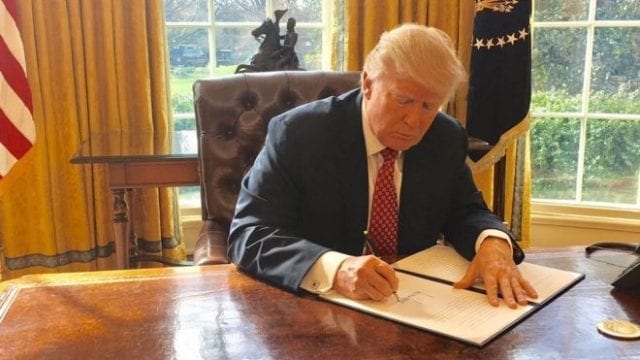President Donald Trump’s travel ban is due back in court on Monday, six weeks before the Supreme Court is scheduled to take on the controversial case.
Politico.com reports that arguments are set to center around certain part of the ban’s enforceability.
While the Supreme Court hasn’t yet offered any definitive ruling on the executive order’s constitutionality, directives issued in June and July allowed sections of the action to be enforced.
Right now, the United States cannot unliterally deny visas to individuals with “bona fide relationships” established in America. That term has generally been taken to refer to would-be migrants who have immediate family members or employment positions stateside, and primarily affects residents of the six Muslim-majority countries targeted by the travel ban.
The prelude to the Supreme Court showdown, which will be handled by the 9th Circuit Court of Appeals, will also have sweeping consequences for refugees.
Since assuming the presidency, Donald Trump has strived to deliver on campaign promises to reduce the influx of asylum-seekers to the United States will curbing illegal immigration.

Recent moves supported by the administration, including the RAISE Act, could halve legal immigration, too.
Politico suggests that the arguments broached by the 9th Circuit Court of Appeals will focus on which refugees should be exempted from the travel ban.
“This will be the most important interpretation yet of what the Supreme Court said on June 26th,” said University of Texas law professor Stephen Vladeck.
A ruling delivered by Hawaii-based Judge Derrick Watson declared that individuals who have already been assigned to refugee-resettlement agencies have what should be considered a “bona fide relationship” with the United States.
Melanie Nezer of HIAS, a refugee resettlement group, said, “Refugees – that really seems to be where the arguments are and where most of the focus will be.”
President Trump is asking that the Supreme Court overturn large portions of Watson’s verdict, including the assertion that connection to a resettlement organization constitutes a bonda fide relationship to the United States. The administration is also opposing the inclusion of grandparents and cousins as proximate enough to warrant family reunification visas and visitation allowances.
On top of the travel ban, President Trump is actively trying to reduce the number of annual allowances for refugees.
Under former President Barack Obama, refugee admittances were capped at 110,000 per year.
As of the end of August, about 50,900 asylum-seekers were allowed to enter and take up at least temporary residence on American soil. The fiscal year, which determines refugee entry allowances, ends at the end of September.
Sources
Trump travel ban back in court Monday
Trump’s New Travel Ban Blocks Migrants From Six Nations, Sparing Iraq
US President Donald Trump signs new travel ban, exempts Iraq


Join the conversation!